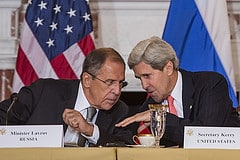The US and Russia yesterday reached what looks to be a solid agreement on how to proceed with the dismantling of the chemical weapons stores of the Syrian government as well as destruction of Syria’s production capabilities. Syria agreed to the Russian-proposed deal (with a little inspiration from US Secretary of State John Kerry) with the understanding that giving up its chemical weapons would avert a US military attack.
The agreement seems full enough of ambiguities regarding the consequences of less than full Syrian compliance to allow the US government some face-saving saber rattling about retaining the option to strike unilaterally, while being vague enough in defining what exactly constitutes non-compliance to make difficult a clear cut case for a UN Chapter 7 use of force resolution. In other words, seemingly win-win.
The process of identifying and destroying the Syrian cache of chemical weapons is supposed to be completed by next year, but adhering to such a timeline can be difficult. In 1997, the US promised to destroy its vast stores of chemical and biological weapons in ten years. Thirteen years later, the US retains some 2,611 tons of mustard gas and 524 tons of other chemical weapons, including sarin gas.
The US and Russian side have both indicated a new determination to bring the Syrian government and the insurgents fighting to overthrow it to a new round of talks in Geneva, optimistically by October. This is unlikely, however, as although the Russian side had managed to secure agreement to attend on the part of the Syrian government, with which it maintains cordial relations, the US has been completely unable to secure any agreement with the various insurgent factions it is supporting.
Western media and governments claimed that the armed Syrian rebellion started because the Syrian government fired on peaceful demonstrators. That has been proven false many times over, as it became clear that the Islamist extremist struggle against the secular Assad regime had been planned well in advance by forces outside Syria and had been armed from the start.
That Assad retains a level of popularity among the Syrian population — particularly the Christian minority that has come under attack by the insurgents — has been confirmed by polls and by the simple fact that two years into an insurgency heavily supported by outside powers he has managed to retain his position. If his government were as unpopular as was claimed, it would have been impossible to withstand the internal and external pressure.
The US/Russia agreement takes the WMD issue off the table for the US and its regime change allies in Saudi Arabia, Turkey, Israel, and elsewhere. US action is required, it has been claimed, because the Syrian government’s chemical weapons stores are a threat to the region and beyond. Those are to be secured by the UN.
So by what justification does the United States continue to arm and train, in violation of international law, the insurgents that seek to overthrow the Syrian government?
The answer is that there is no justification, as should be obvious at this point. Will the media begin asking these questions? Don’t hold your breath, but there is a sense that a profound shift in the “unipolar moment” that has categorized the post-Cold War period has taken place. There is a sense that the tectonic plates of the existing world order have shifted slightly. History shows us that when a shift occurs, in plate tectonics and in world balance of power, the resulting earthquake can be sudden and profound.
Flickr/Secretary of Defense

